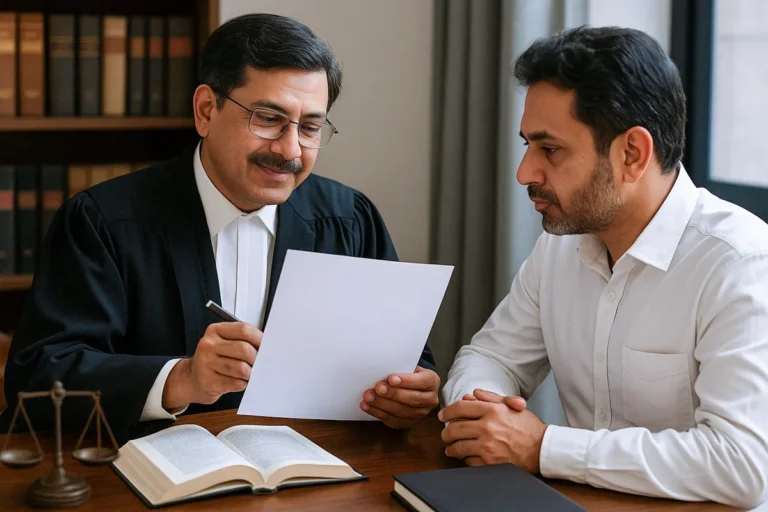What are the Types of Bails in India & Their Conditions
‘Bail’ is derived from the old French verb ‘Baillier’, meaning to ‘give or deliver’. Section 2 (1)(b) Of Bharatiya Nagarik Suraksha Sanhita, 2023 (hereinafter referred to as BNSS) states “bail” means release of a person accused of or suspected of commission of an offence from the custody of law upon certain conditions imposed by an officer or Court on execution by such person of a bond or a bail bond.
Bail remains one of the vital concepts of the criminal justice system in consonance with the fundamental principles enshrined in Parts III and IV of the Constitution, along with the protection of human rights as prescribed under International treaties/covenants.
According to Halsbury’s Laws of England, “the effect of granting bail is not to set the defendant (accused) free, but to release him from the custody of law and to entrust him to the custody of his sureties who are bound to produce him to appear at his trial at a specified time. and place. The sureties may seize their principal at any time and may discharge themselves by handing him over to the custody of the law, and he will then be imprisoned.
The literal meaning of the word “bail” is surety. Bail, therefore, refers to release from custody, either on personal bond or with sureties. Bail relies on release subject to monetary assurance, either one’s own assurance (also called personal bond/recognizance) or through third-party sureties. The Supreme Court has also reiterated this definition in the Moti Ram Case
According to Black’s Law Dictionary, what is contemplated by bail is to “procure the release of a person from legal custody, by undertaking that he/she shall appear at the time and place designated and submit him/herself to the jurisdiction and judgment of the court.”

What is Bail?
Bail is a legal mechanism that permits the temporary release of an accused person from custody while they await trial. The fundamental principle behind bail is that an individual is presumed innocent until proven guilty. The provisions related to bail are primarily governed by the Code of Criminal Procedure, 1973 (CrPC).
OBJECTIVE OF BAIL IN INDIA
The primary objective of bail in India is to ensure that an accused person is not unjustly detained before trial, balancing the rights of the accused with the interests of justice. Bail serves several key purposes:
- Preservation of Personal Liberty: Bail ensures that an individual’s liberty is not arbitrarily curtailed without due process, as guaranteed by Article 21 of the Indian Constitution.
- Prevention of Pre-Trial Punishment: It prevents undue incarceration of individuals awaiting trial or investigation, safeguarding their dignity and rights.
- Ensuring Presence at Trial: The primary purpose of bail is to secure the accused’s attendance at trial or investigation proceedings, acting as a guarantee to deter absconding.
- Decongesting Prisons: Bail helps reduce the burden on the prison system by allowing undertrials to be released temporarily.
In the case of Sanjay Chandra v. CBI (2011), the Supreme Court of India emphasized the importance of bail in ensuring that an accused person is not unfairly detained.
It defined the objective of bail as follows in bail applications, generally, it has been laid down from the earliest times that the object of bail is to secure the appearance of the accused person at his trial by reasonable bail.
The object of bail is neither punitive nor preventative. Deprivation of liberty must be considered a punishment, unless it can be required to ensure that an accused person will stand his trial when called upon. The courts owe more than verbal respect to the principle that punishment begins after conviction, and that every man is deemed to be innocent until duly tried and duly found guilty.
From the earliest times, it was appreciated that detention in custody pending completion of trial could be a cause of great hardship. From time to time, necessity demands that some un-convicted persons should be held in custody pending trial to secure their attendance at the trial but in such cases, ‘necessity’ is the operative test. In this country, it would be quite contrary to the concept of personal liberty enshrined in the Constitution that any person should be punished in respect of any matter, upon which, he has not been convicted or that in any circumstances, he should be deprived of his liberty upon only the belief that he will tamper with the witnesses if left at liberty, save in the most extraordinary circumstances.
Apart from the question of prevention being the object of a refusal of bail, one must not lose sight of the fact that any imprisonment before conviction has a substantial punitive content and it would be improper for any Court to refuse bail as a mark of disapproval of former conduct whether the accused has been convicted for it or not or to refuse bail to an un-convicted person for the purpose of giving him a taste of imprisonment as a lesson.
BAILABLE AND NON-BAILABLE OFFENCES
Under the Code of Criminal Procedure,1973 (CrPC)
Bailable Offences: These are offences where bail can be granted as a matter of right. They are typically less serious crimes, punishable with imprisonment for a term of less than three years or with a fine only. Examples include theft, causing hurt, mischief, defamation, and simple assault. Bail can be granted by a police officer or at the police station.
Non-Bailable Offences: These are offences where bail is not a matter of right but is subject to the discretion of the court. They are more serious and are punishable with imprisonment for three years or more. Examples include murder, rape, dacoity, and kidnapping. Bail can only be granted by a court of law.
Under the Bharatiya Nagarik Suraksha Sanhita,2023 (BNSS)
Bailable Offences: Similar to the CrPC, bailable offences under BNSS are those where bail can be granted as a matter of right. They are less serious crimes, punishable with imprisonment for a term of less than three years or a fine only. Examples include causing mischief and simple assault. Section 478 of BNSS outlines provisions for bail in bailable offences.
Non-Bailable Offences: These are more serious offences that require the court’s discretion for bail. They are generally punishable with imprisonment for three years or more. Examples include murder, rape, and dacoity. Section 480 of BNSS governs the provisions for bail in non-bailable offences.
Types of Bail in India
The Bharatiya Nagarik Suraksha Sanhita,2023 (BNSS) contains elaborate provisions relating to bail. The different kinds of bail:-

- Bail in a Bailable offence
- Bail in Non-bailable offence
- Anticipatory bail
- Bail on default
- Interim bail
- Pre-Conviction and Post-Conviction Bail
1. Regular Bail / Bail in Bailable offence
Provisions under Cr.P.C
Section 436 provides for the release on bail of a person accused of a bailable offense. Section 436 of Cr.PC is mandatory in nature and the court or the police have no discretion in the matter. Any accused person arrested for a bailable offence willing to provide bail must be released. The only discretion available with the police is to release the accused either on a personal bond or with sureties. In cases where the accused is unable to provide bail, the police officer must produce the accused person before the Magistrate within 24 hours of arrest as specified under Sec. 57 of Cr.P.C. Subsequently. When the person accused of an offense is produced before a Magistrate and is willing to furnish bail, then the Magistrate must release the accused person, and the only discretion available is to release either on personal bond or a bond with sureties. The Magistrate cannot authorize detention of a person who is willing to furnish bail with or without sureties, even for the purposes of aiding the investigation.
Bail Under BNSS
Section 478 of the Bharatiya Nagarik Suraksha Sanhita (BNSS) outlines the conditions under which bail can be granted. This section is crucial for understanding the bail provisions in bailable offences.
Eligibility for Bail: This section applies to any person arrested or detained without a warrant by an officer in charge of a police station, except for those accused of non-bailable offences.
Right to Bail: The person must be prepared to give bail at any time while in custody or before a court. If they are indigent and unable to furnish a surety, they may be discharged on executing a personal bond for their appearance.
Conditions for Bail: The court or Police officer may refuse bail if the person fails to comply with the conditions of the bond or bail bond regarding attendance.
2. Bail in case of a non-bailable offence
Provisions under Cr.P.C
Provision, as to bail in case of non-bailable offence, is laid down in Section 437 of the Code. This section gives discretionary power to the Court (other than the High Court or the Court of Session) to release an accused on bail in a non-bailable case. It lists down circumstances when bail will not be granted or when bail will be granted with specific conditions, etc.
Provisions under BNSS
Section 480 of the Bharatiya Nagarik Suraksha Sanhita, 2023 (BNSS) addresses bail in non-bailable offenses, outlining specific conditions and exceptions14.
General Rule: A person accused of, or suspected of, the commission of any non-bailable offence is arrested or detained without warrant by an officer in charge of a police station or appears or is brought before a Court other than the High Court or Court of Session, he may be released on bail, such person shall not be so released if there appear reasonable grounds for believing that he has been guilty of an offence punishable with death or imprisonment for life; such person shall not be so released if such offence is a cognizable offence and he had been previously convicted of an offence punishable with death, imprisonment for life or imprisonment for seven years or more, or he had been previously convicted on two or more occasions of a cognizable offence punishable with imprisonment for three years or more but less than seven years:
Exceptions: Even if the above conditions are met, a court may release the person on bail if they are a child, woman, sick, or infirm. The court may also grant bail if there is another special reason to do so.
Additional Provisions: The court won’t refuse bail just because the accused needs to be identified by witnesses or is required for police custody beyond the first 15 days, if they are otherwise entitled to bail and promise to comply with court directions. The Public Prosecutor must be given an opportunity to be heard if the alleged offense is punishable with death, imprisonment for life, or imprisonment for seven years or more, before the court releases the accused on bail.
Further Inquiry: If there aren’t reasonable grounds to believe the accused committed a non-bailable offense, but there are sufficient grounds for further inquiry, the accused can be released on bail pending the inquiry.
Conditions for Release: When granting bail under this section for offenses punishable with imprisonment that may extend to seven years or more, or offenses under specified chapters, the Court must impose conditions such as attending court as required, not committing similar offenses, and not influencing witnesses or tampering with evidence.
Recording Reasons: An officer or a Court releasing any person on bail must record in writing the reasons or special reasons for doing so.
Re-arrest: Any Court that has released a person on bail may direct that the person be arrested and committed to custody.
Magistrate Trial: If the trial isn’t concluded within 60 days from the first date fixed for taking evidence, the accused must be released on bail, unless the Magistrate directs otherwise for reasons recorded in writing.
Post-Trial Release: After the trial concludes but before judgment, the Court believes there are reasonable grounds for believing that the accused is not guilty of any such offence, it shall release the accused, if he is in custody, on the execution by him of a bond for his appearance to hear judgment delivered.
3. Anticipatory Bail
Anticipatory bail means bail in anticipation of an arrest. Any person who apprehends arrest under a non-bailable offence in India can apply for Anticipatory Bail.
Prior to the enactment of the new criminal laws, the provisions of section 438 of The Code of Criminal Procedure, 1973 governed the provisions for Anticipatory Bail.
Provisions under BNSS
Section 482 of the BNSS provides for the grant of anticipatory bail to individuals who believe they may be arrested for a non-bailable offence. This section is designed to protect personal liberty by allowing courts to intervene before an arrest is made.
Application for Anticipatory Bail: Any person who believes they may be arrested for a non-bailable offence can apply to the High Court or the Court of Session for a direction under this section.
The court may direct that if the person is arrested, they shall be released on bail.
Conditions for Bail: The court may impose conditions such as requiring the person to be available for police interrogation, not influencing witnesses, and not leaving India without court permission.
Other conditions may be imposed as per Section 480(3) of the BNSS.
Procedure After Arrest: If such a person is thereafter arrested without warrant by an officer in charge of a police station on such an accusation, and is prepared either at the time of arrest or at any time while in the custody of such officer to give bail, they must be released on bail.
If a Magistrate decides to issue a warrant, it should be a bailable warrant in line with the court’s direction.
Exceptions: This section does not apply to cases involving offences under section 65 and sub-section (2) of section 70 of the Bharatiya Nyaya Sanhita, 2023.
Scope and Ambit of Anticipatory Bail
The court in the case of Siddharam Satlingappa Mhetre v. State of Maharashtra, discussed the scope and ambit of anticipatory bail and said that principles regarding it has been laid down the following guidelines :
- The provision of Anticipatory Bail is to be interpreted in light of Article 21 of the Constitution of India.
- Filing of FIR is not a condition precedent to exercise Anticipatory Bail.
- Order for Anticipatory Bail would not affect the right of police to conduct investigation.
- Although the power to release on anticipatory bail can be described as of an “extraordinary” character this would “not justify the conclusion that the power must be exercised in exceptional cases only.”
4. Bail on Default
Section 167(2) of the Criminal Procedure Code, 1973 empowers judicial magistrates to authorize custody of an accused person in cases wherein investigation cannot be completed in twenty-four hours. It provides for the maximum period of custody that can be authorized. It further contains a mandate that if the investigation is not completed within the stipulated maximum period, the accused is to be released on bail whatever may be the nature of the accusation against him.
The object of this provision manifests the legislative anxiety that once a person’s liberty has been interfered with, the arrest made without a warrant or a court order, the investigation must be conducted with utmost urgency Persons who are detained for committing an offence and undergoing investigation are statutorily eligible for bail under Section 167(2) of Code after ninety days where the investigation relates to an offence punishable with death, imprisonment for life or imprisonment for not less than ten years, and sixty days where the investigation is relating to any other offence, if the investigating authorities fail to complete their investigation and file a charge-sheet within this period.
Provisions under BNSS
Section 187(3) of BNSS outlines specific guidelines for the detention of accused individuals when investigations cannot be completed within 24 hours.
A Magistrate can extend the detention of an accused person beyond 15 days if there are adequate grounds for doing so. However, the total detention period is capped at:
Ninety (90) Days for offences punishable with death, life imprisonment, or imprisonment for ten years or more.
Sixty (60) Days for all other offences.
Release on Bail: Upon the expiry of the specified detention period (90 or 60 days), the accused person must be released on bail if they are prepared to furnish it. This release is considered to be under the provisions of Chapter XXXV of the BNSS.
Conditions for Release: The accused must be willing and able to provide bail to be released. If they fail to furnish bail, they will remain in custody until they do so.
Implications
Protection of Rights: These provisions aim to balance the need for thorough investigations with the protection of individual rights, ensuring that detention is not excessively prolonged without sufficient justification.
5. Interim Bail
Interim bail is a temporary release granted for a fixed period, typically in exceptional circumstances. It is distinct from regular bail and should not serve as a substitute for it. The duration of interim bail should be minimal and justified by compelling reasons.
There is no express legal provision of ad-interim or interim bail. Section 439 CrPC is on the High Court’s and the Sessions Court’s power to release the accused on bail in custody. Evident as it is that Sections 436, 437 and 439 are repositories of powers of the court to release the accused in custody on bail. That’s post-arrest. As seen above, the newly substituted Section 438 expressly provides for interim bail pending disposal of the plea for anticipatory bail. It’s an important provision as the accused faces the threat of arrest before his application for the bail is decided. Also, it’s consistent with the concept of fundamental right to life and liberty under Article 21 of the Constitution of India. Interim bail may be granted when the court is satisfied that the object of the. However, this kind of bail may be granted at any stage of a case by way of court’s inherent power
Under the BNSS, Section 482 provides for anticipatory bail, which includes interim orders while a formal application is pending. Courts have the power to grant or refuse ad-interim bail pending the disposal of the main application.
Conditions for Granting Interim Bail
Compelling Reasons: Interim bail is granted in exceptional circumstances, such as medical emergencies, family commitments, or educational needs.
Conditions Imposed: Courts may impose conditions to ensure compliance and prevent tampering with evidence. Common conditions include joining further investigations, not tampering with prosecution evidence, and not leaving the country without permission.
Case Law Supporting Interim Bail
Sukhwant Singh & Ors Vs State of Punjab: Highlighted interim bail as a protective measure for an accused’s reputation1.
Priya Ranjan vs. State of Odisha (2021): Granted interim bail for humanitarian reasons, allowing the petitioner to officiate at his mother’s funeral.
Ashique Ilahi VS State (NCT of Delhi): Interim bail was granted based on medical grounds.
Pre-Conviction and Post-Conviction Bail Provisions in BNSS
Section 479 of BNSS: This section provides for the release of undertrial prisoners on bail after serving a certain portion of the maximum sentence. For first-time offenders, bail is granted after serving one-third of the sentence, while others may be released after serving half of the sentence.
Multiple Cases Pending: Bail is not granted if multiple cases are pending against the accused.
Jail Superintendent’s Role: The Superintendent must apply to the court for the release of undertrial prisoners who have served the required portion of their sentence.
Post-Conviction Scenarios
After conviction, the primary focus is on sentencing and appeals rather than bail. The accused may appeal the conviction to a higher court, and during this process, they may be required to execute bail bonds to ensure their appearance in court
Section 389 (1) and (2) of Cr.P.C. deals with a situation where a convicted person can get a Bail from appellate court after filing the criminal appeal. Section 389 (3) deals with a situation where the trial court itself can grant a bail to a convicted accused enabling him to prefer an appeal.
Section 430 of the BNSS deals with the suspension of a sentence pending appeal and the release of an appellant on bail. This provision allows the Appellate Court to intervene in the execution of a sentence during the appeal process, ensuring that individuals are not unduly incarcerated while their appeals are pending.
Suspension of Sentence and Release on Bail: The Appellate Court may suspend the execution of a sentence and release the appellant on bail or on their own bond or bail bond, provided it records the reasons for doing so in writing.
If the convicted person is in confinement, they may be released on bail or on their own bond/bail bond.
Special Considerations for Serious Offences: For offences punishable by death, life imprisonment, or imprisonment for ten years or more, the Appellate Court must give the Public Prosecutor an opportunity to show cause in writing against the release. The Public Prosecutor can also file an application for cancellation of bail if the appellant is released on bail.
Provisions for Convicted Persons Intending to Appeal: If a convicted person intends to appeal, they may be released on bail unless there are special reasons for refusal. This applies if the sentence is for three years or less or if the offence is bailable.
The sentence is deemed suspended while the person is released on bail.
Cancellation of Bail:
The basic criteria for cancellation of bail are interference or even an attempt to interfere with due course of justice or any abuse of indulgence/ privilege granted to the accused. In Ram Govind Upadhya Vs. Sudarshan Singh it was held by the Hon’ble Apex court, that the power of the to cancel bail can be invoked either by the state itself or by any aggrieved party or even suo motu the same was also held in the case of Puran vs. Ramvilas.”
As per Section 437 (5) of Cr.P.C. any Court which has released a person on bail may, if it considered it necessary to do so, cancel the bail and direct that such person be arrested and committed to custody. In R.J Sharma Vs. R.P. Patankar, it was held that the Magistrate ought to pursue the application for cancellation of bail and afford an opportunity for the accused to be heard.
Provisions under BNSS
Section 480(5) allows the court that initially granted bail to arrest and detain the person if new circumstances arise that necessitate the cancellation of bail. This power is typically exercised by lower courts, including Magistrates5.
Section 483(3) grants the High Court and Court of Session the authority to direct the arrest and custody of a person who has been released on bail. The grounds for such action include sufficient evidence of breach of bail conditions or if the court deems it necessary in the interest of justice157.
Grounds for Bail Cancellation:
- Violates bail conditions.
- Commits another crime while on bail.
- Interferes with the investigation or attempts to influence witnesses.
- Absconds or fails to appear in court
In Dolat Ram v. State of Haryana” The Hon’ble Supreme Court has held that once bail has been granted, it can only be cancelled based on cogent and overwhelming circumstances. Proceedings for the cancellation of bail are not in the nature of an appeal from the grant of bail, and therefore, a court must look for circumstances that warrant cancellation of bail, such as interference or attempt to interfere with the due course of justice, or abuse of concession of bail granted to the accused in any manner. Bail granted to an accused with reference to bailable offence can be cancelled only if the accused (1) misuses his liberty by indulging in similar criminal activity, (2) interferes with the course of investigation, (3) attempts to tamper with evidence of witnesses, (4) threatens witnesses or indulges in similar activities which would hamper smooth investigation, (5) attempts to flee to another country, (6) attempts to make himself scarce by going underground or becoming unavailable to the investigating agency. (7) attempts to place himself beyond the reach of his surety, etc. These grounds are illustrative and not exhaustive. However, a bail granted to a person accused of bailable offence cannot be cancelled on the ground that the complainant was not heard.
How to Apply for Bail in India?
To apply for any type of bail in India, the process begins by consulting a qualified lawyer who can draft and file the bail application in the appropriate court, depending on the offense. During the court hearing, both the prosecution and defense present their arguments, and if the court approves the bail, the accused must fulfill the required conditions, such as submitting a surety or personal bond.
Step 1: Engage a Lawyer
A legal expert can help draft and submit the bail application.
Step 2: File a Bail Application
The application must be filed in the appropriate court (Magistrate, Sessions, or High Court) based on the nature of the offense.
Step 3: Court Hearing
The prosecution and defense present their arguments, and the judge evaluates whether bail should be granted.
Step 4: Bail Order Issuance
If bail is granted, the accused must fulfill the court’s conditions, such as submitting a surety bond or a personal bond.
Frequently Asked Questions (FAQs)
Can bail be canceled after being granted?
Yes, if the accused violates bail conditions, the court can revoke bail.
Is anticipatory bail permanent?
No, it typically lasts until the trial begins, after which the accused must seek regular bail.
Can a person get bail for murder?
Bail for serious crimes like murder is challenging but can be granted under exceptional circumstances by higher courts.
Can bail conditions be modified?
Yes, the accused can file an application to modify bail conditions based on new circumstances
Where can I find a good lawyer for bail cases?
It’s advisable to consult experienced criminal lawyers in India through legal directories or bar associations.
Conclusion
The bail system in India embodies a balance between individual liberty and societal interest, reflecting the fundamental principles of justice as enshrined in the Constitution. Bail serves as a crucial mechanism to prevent arbitrary detention while ensuring accused individuals can attend the legal proceedings without undue hardship. The framework established by the Code of Criminal Procedure, 1973 (CrPC) and the recent Bharatiya Nagarik Suraksha Sanhita, 2023 (BNSS) delineates clear categories and types of bail—bailable and non-bailable offences, anticipatory bail, interim bail, and the specific conditions governing each type.
For more legal insights, check out our Legal Blog or contact our expert legal team for guidance.
Disclaimer: This article is for informational purposes only and does not constitute legal advice. Consult a qualified lawyer for legal guidance.







